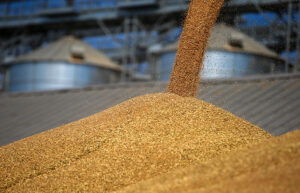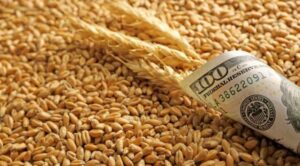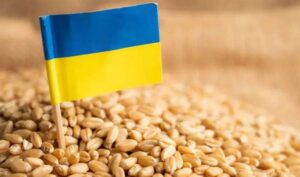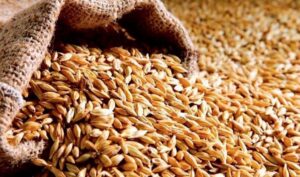
“Nibulon is now one of the three largest grain exporters in Ukraine and has been profitable for two and a half years, with EBITDA of approximately $68 million in 2024, Andriy Vadatursky, owner of one of the largest grain market operators in Ukraine, JV Nibulon LLC, told NV in an interview.
He noted that this figure is slightly lower than the agricultural holding planned due to difficulties in the second half of the year, and added that in a few days he will have the exact figure of financial performance for 2024.
Commenting on the information about the increase in the share of Nibulon’s own fleet in 2024 from 26% to 55%, and the volume of transportation from 278 thousand tons to 404 thousand tons, Vadatursky reminded that the company was built on investments in alternative ways of delivering products, in particular, in water transport. Accordingly, elevators were built on the Dnipro River and the Southern Bug River.
“Now all this is standing still. Kherson is under fire, Mykolaiv is closed. The fleet has nowhere to work. More than 100 ships are blocked. Some elevators, even in the occupied territory, are left without water. The
Kakhovka dam was broken in May 2023. The prospect of returning was taken away from us. I can’t imagine that the river (transportation by the Dnipro) will work for 5-10 years, even after the victory,” he said.
To solve this problem, Nibulon leased vehicles from Scania (Sweden), increased the number of vehicles and, of course, optimized its operations to use its own vehicles as much as possible.
“We have 138 new vehicles in total. We have purchased about 70 vehicles, I think, for EUR 17 million. Denmark also helped us. They take care of Mykolaiv region. For example, we got a loan from EIFO. Denmark gave us a 14-year loan for agriculture. (…) We received about EUR12.5 million. We purchased German machinery,” said the owner of the agricultural holding.
Mr. Vadatursky added that foreign investors are extremely cautious about investing in Ukraine, while bureaucratic Europe is very slow to change course and spends a lot of time on simple things.
JV Nibulon LLC was established in 1991. Prior to the Russian military invasion, the grain trader had 27 transshipment terminals and crop reception complexes, a one-time storage capacity of 2.25 million tons of agricultural products, a fleet of 83 vessels (including 23 tugs), and owned the Mykolaiv Shipyard.
“Before the war, Nibulon cultivated 82 thousand hectares of land in 12 regions of Ukraine and exported agricultural products to more than 70 countries. In 2021, the grain trader exported the highest ever volume of 5.64 million tons of agricultural products, reaching record volumes of supplies to foreign markets in August – 0.7 million tons, in the fourth quarter – 1.88 million tons, and in the second half of the year – 3.71 million tons.
Nibulon’s losses due to Russia’s full-scale military invasion in 2022 exceeded $416 million.
Currently, the grain trader is operating at 32% of capacity, has created a special unit to clear agricultural land of mines, and was forced to move its headquarters from Mykolaiv to Kyiv.

As of January 29, Ukraine exported 25.353 mln tonnes of grains and pulses since the beginning of 2024/25 marketing year (July 2024 – June 2025), of which 3.121 mln tonnes were shipped this month, the press service of the Ministry of Agrarian Policy reported citing the data of the State Customs Service.
It is noted that as of January 30 last year, the total shipments amounted to 23.146 million tons, including 4.582 million tons in January.
In the current season, Ukraine has already exported 10.7 mln tonnes of wheat (9.027 mln tonnes in 2023/24 MY), 2.064 mln tonnes of barley (1.4 mln tonnes), 10.8 thsd tonnes of rye (1 thsd tonnes), and 12.166 mln tonnes of corn (12.465 mln tonnes).
As of January 29, the total exports of Ukrainian flour in the current season are estimated at 43.3 thsd tonnes (52 thsd tonnes in 2023/24 MY), including 39.9 thsd tonnes of wheat (48.6 thsd tonnes).

Since the beginning of 2024-2025 marketing year (July-June) and as of January 24, Ukraine exported 24.475 mln tonnes of grains and pulses, of which 2.514 mln tonnes were shipped this month, the press service of the Ministry of Agrarian Policy and Food reported, citing the data of the State Customs Service of Ukraine.
According to the report, as of the same date last year, the total shipments amounted to 22.246 mln tons, including 3.682 mln tons in January.
In terms of crops, since the beginning of the current season, the country has exported 10.563 mln tonnes of wheat (650 thsd tonnes in January), 2.035 mln tonnes of barley (36 thsd tonnes), 10.8 thsd tonnes of rye (0), and 11.729 mln tonnes of corn (1.82 mln tonnes).
Thus, the volume of wheat exports for 2024/2025 MY agreed by the Ministry of Agrarian Policy and grain market participants at 16.2 mln tonnes has already been exhausted by 65%.
The total exports of Ukrainian flour since the beginning of the season as of January 24 are estimated at 41.6 thsd tonnes (4 thsd tonnes in January), including 38.2 thsd tonnes of wheat (3.7 thsd tonnes).

In 2024, Agrotrade agricultural holding exported more than 450 thsd tonnes of grain, of which the share of its own agricultural products amounted to 230 thsd tonnes, and third-party producers – 227 thsd tonnes, the press service of the agricultural holding reported.
According to the report, most of the grain was exported to Turkey, Italy, Spain, the Netherlands, and Belgium. A partnership project with other suppliers allowed the company to expand its geography: for the first time, it shipped 54.5 thsd tonnes of wheat to Bangladesh.
“2024 was one of the most difficult years for the Ukrainian agricultural sector. The main challenges included a reduction in grain production, difficulties in finding margins, as well as constant air alerts, power outages and destroyed transportation routes due to missile attacks. Sometimes we had to change our plans drastically: look for places to store grain or adapt logistics in a short time. However, even in such conditions, we remained flexible and fully fulfilled our obligations to our customers,” said Andriy But, Director of Foreign Economic Activity Department at Agrotrade.
The agricultural holding specified that in 2024, corn and wheat were in the highest demand on the global market.
The active period of the grain trading season will end earlier – in April-May 2025. This is due to a drop in yields and a decrease in grain stocks over the past years, Agrotrade predicts.
The Agrotrade Group is a vertically integrated holding company with a full agro-industrial cycle (production, processing, storage and trade of agricultural products). It cultivates over 70 thousand hectares of land in Chernihiv, Sumy, Poltava and Kharkiv regions. Its main crops are sunflower, corn, winter wheat, soybeans and rapeseed. It has its own network of elevators with a simultaneous storage capacity of 570 thousand tons.
The group also produces hybrid seeds of corn and sunflower, barley, and winter wheat. In 2014, a seed plant with a capacity of 20 thousand tons of seeds per year was built on the basis of Kolos seed farm (Kharkiv region). In 2018, Agrotrade launched its own brand Agroseeds on the market.
Vsevolod Kozhemiako is the founder and CEO of Agrotrade.

As of January 15, Ukraine exported 23.616 mln tonnes of grains and pulses since the beginning of the 2024-2025 marketing year (July 2024 – June 2025), of which 1.388 mln tonnes were shipped this month, the press service of the Ministry of Agrarian Policy and Food reported, citing the data of the State Customs Service of Ukraine.
According to the report, as of the same date last year, the total shipments amounted to 20.563 million tons, including 2.097 million tons in January.
In terms of crops, since the beginning of the current season, Ukraine has exported 10.326 million tons of wheat (413 thousand tons in January), 2.008 million tons of barley (9 thousand tons), 10.8 thousand tons of rye (0), and 10.868 million tons of corn (959 thousand tons).
The total export of Ukrainian flour since the beginning of the season as of January 15 is estimated at 39.4 thsd tonnes (1.8 thsd tonnes in January), including 36.1 thsd tonnes of wheat (1.6 thsd tonnes).

Ukraine’s grain harvest in 2025-2026 marketing year will be at the level of 55-65 million tons, grain exports – 40-50 million tons, and oilseeds harvest will also exceed last year’s and is expected to be at the level of 24 million tons, predicts Sergiy Feofilov, general director of information and analytical agency UkrAgroConsult.
“Rapeseed and sunflower will remain the most marginal, while corn will show stable margin growth due to the recovery of demand,” he explained in an interview published on the agency’s website.
The expert believes that in 2025 agrarians will emphasize the development of processing and increase exports of value-added products (oil, meal, flour, fodder), which will reduce dependence on logistics costs and increase revenues.
According to Feofilov, the focus of trade will shift to North Africa, Asia and the Middle East, where demand for grains and oilseeds is growing, and Ukraine can respond to these challenges by expanding its markets.
The head of “UkrAgroConsult” expressed confidence that this year the key issues for Ukrainian farmers will remain the increase in the share of high value-added products in exports, trends in the growth of lending to farms, adaptation of agricultural technologies to climate change, rising prices for resources and increasing number of sudden requests.
The issues of security, energy independence, increasing the profitability of farmers, adaptation to environmental standards, harmonization of Ukrainian legislation to European legislation, international cooperation, restoration and improvement of logistics chains will also be relevant, summarized Feofilov.